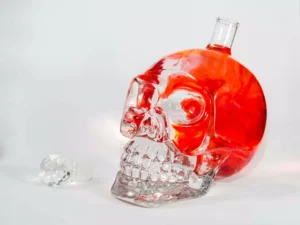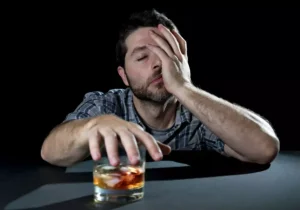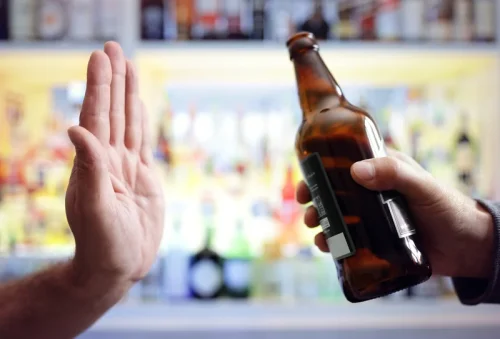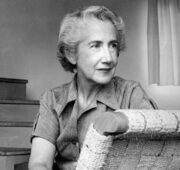
In addition to light, other cues such as physical activity or feeding are considered as non-photic cues that can be used to reset the circadian clock. Non-photic phase-resetting is the process of shifting and/or synchronizing the circadian clock using non-photic stimulus. The circadian clock may modulate sleep-wake cycle with the help of melatonin. “Providing times for when to stop drinking alcohol, start winding down for bed, and my optimal wake-up and go-to-bed times have been so helpful…I think it’s helping me set a course to be more in control of my sleep and energy throughout the day.” Read the review. Make sure you’re drinking throughout the day and not too close to bedtime. Cut yourself from liquids at least two hours before bed to avoid middle-of-the-night bathroom trips.
- People with insomnia have an increased risk of developing alcohol use disorder, potentially because many individuals turn to alcohol as a sleep aid.
- Rarely is it the cravings of alcohol that drive those in recovery to relapse.
- Over the thirty years follow up, women generally reported more chronic sleep problems than men (Table 2).
- In a study of 42 recovering alcoholics (15 women) and 42 controls (23women), we found that women had a better sleep efficiency and more delta activity duringNREM sleep than men, regardless of diagnosis (Colrain,Turlington, and Baker 2009a).
An Overview of Sex and Gender Considerations in Sleep and Alcohol Use
This can leave you feeling like you have insomnia after drinking alcohol—and it’s why having a nightcap before bed might not be such a good idea after all. Our finding that those who have trouble falling asleep were more likely to be persistent heavy drinking suggests that they may be using alcohol as a sedative. This is partially corroborated in an earlier study on same population. The Whitehall II participants were asked about reasons for change in drinking over the last 10 years and an increase in consumption was cited as a means to help get to sleep was by 6% of men and 5% of women21.
Sleep Products
- Subjective complaints in those with insomnia as compared to those without include longer SOL, increased WASO and lower sleep efficiency (Brower et al., 2001a, Conroy et al., 2006b).
- In addition to the electrophysiologic mechanisms of sleep, Borbely and colleagues postulated a two-process model of sleep regulation (Borbely, 1982).
- Improving your overall sleep hygiene can help you fall asleep faster and wake up less often, too.
- We were thus able to look at long-term drinking typologies and persistent sleep problems over three decades.
At the 6-month follow-up, subjects with AD who relapsed had significantly higher PLMI and PLMI with arousals, than those who did not. Conversely, another study failed to find a difference in PLMI between those with AD in early recovery and controls (Le Bon et al., 1997). Magnesium supplementation had a mixed result on PLMs in an open-label trial of AD patients (Hornyak et al., 2004).
How Do You Stop Alcohol from Disrupting Your Sleep?
Alcohol can cause sleepiness and may initially have a sedative effect. This is because it depresses the central nervous system and enhances the effects of the GABA neurotransmitter, alcohol insomnia which slows brain activity. Alcohol causes a higher production of the stress hormone cortisol, which regulates the body’s stress response and initiates wakefulness.

If it’s thought that you could have a sleep disorder, your doctor might suggest going to a sleep center for special testing. Simply cutting back or giving up alcohol or other drugs can be enough to reverse the negative impacts on your sleep (and can greatly improve your health overall). If you have alcohol in your system when you hit the hay, you may not sleep very deeply, or for very long, on and off throughout the night. That’s because as alcohol starts to metabolize, the sedative effect wears off.
1 Alcoholism: Sleep EEG Data
Subjective and objective sleep related disturbances persist for up to 3 years into sobriety as demonstrated by cross-sectional and longitudinal studies. Subjective complaints of insomnia may persist up to 2 years into sobriety (Cohn et al., 2003, Wellman, 1954, Kissin, 1979). Longitudinal studies evaluating PSG sleep have demonstrated the presence of increased SOL and sleep fragmentation, a decreased TST, and, abnormalities in SWS and REM sleep stages. Although increased SOL reached normal levels by 5–9 months into recovery, sleep fragmentation persisted for 21 months and consequently TST was seen to normalize in ≤ 2 years (Adamson and Burdick, 1973, Williams and Rundell, 1981, Drummond et al., 1998). Slow wave sleep is decreased early in recovery and gradually normalizes over time and around 2 years of sobriety (Williams and Rundell, 1981, Imatoh et al., 1986, Drummond et al., 1998).
Large-scale epidemiological studies with validated measures and good operational definitions of insomnia are clearly warranted to establish the incidence and prevalence of insomnia in the alcoholic population and its clinical course in relation to the alcohol disorder. This form of REM rebound cannot explain theincreased REM in those who have been abstinent for a long time, relative to controls. It ispossible that increased REM sleep may represent a predisposition to altered sleep ratherthan a consequence of alcohol abuse; although REM is not elevated in adolescents with apositive family history of alcoholism (Tarokh et al.2012). Another possibility is that alcohol abuse leads to long-lastingneurochemical changes in the brain stem. Figure 2 (adapted from (Colrain, Turlington, and Baker 2009b) gives an example of theproportions of wakefulness (pre-sleep and throughout the night), and different sleep stagesin alcoholic and control men and women. Other primary sleep disorders may occur more commonly with AD and present as insomnia in the clinical setting.
Heart rate increase

Because alcohol’s effects vary for each person, even small amounts can worsen sleep quality for some people. In a recent cross-sectional population study of 187,950 adults in the United States short sleep prevalence was higher among adults who consumed any alcohol compared with those who never consume alcohol18. Our findings contrast with this study in that we did not find strong association between drinking and sleep duration. Jackson et al. note that the prevalence of short sleep across alcohol consumption patterns was more variable among whites, and the majority of Whitehall II participants are white. Among those with AD, treatment-seeking subjects have been demonstrated to have a higher Periodic Limb Movement Index (PLMI) as compared to controls (Brower and Hall, 2001). A longitudinal study involving patients sober for 2–3 weeks after withdrawal, demonstrated higher baseline PLMI and PLMI with arousals versus healthy controls (Gann et al., 2002).

However, there is evidence that alcohol consumption also disrupts sleep, particularly the period of rapid eye movement (REM) sleep7. The perpetual use of alcohol as a sleep aid may be a counterproductive long-term strategy as alcohol disrupts sleep quality and intensifies the need to consume more alcohol8. The association of alcohol dependence with insomnia may be https://ecosoberhouse.com/ bidirectional in nature9. Before we look at the effects of alcohol on sleep in detail, here’s the basic bottom line. The more you drink, and the closer your drinking is to bedtime, the more it will negatively impact your sleep. Even moderate amounts of alcohol in your system at bedtime alters sleep architecture—the natural flow of sleep through different stages.
- In summary, moderate doses of alcohol may decrease the amount of REM sleep through the night.
- Recentwork has identified an important role for GABAergic interneurons that act to facilitate theREM-off process (McCarley 2011).
- A 2019 study showed that individuals who sleep for under 6 hours each night have a 20% higher chance of heart attack than individuals who sleep between 6 and 9 hours.
- Even though alcohol can make you feel sleepy, it may impact your overall quality of sleep.
- But even a regular, moderate routine of two to three drinks a day is enough to create sleep and performance problems for many people.
- People who consume alcohol may wake up during sleep and experience increased disruptions such as sleep apnea and snoring.
This acute insomnia becomes persistent because of perpetuating factors such as reading in bed (Spielman et al., 1987) or drinking alcohol. Figure 2 presents a conceptual model for insomnia in AD during recovery. Sleep problems are common during this phase and may be prevalent in about 65% of individuals during this phase (Brower et al., 2001a, Kolla et al., 2014). Subjective complaints in those with insomnia as compared to those without include longer SOL, increased WASO and lower sleep efficiency (Brower et al., 2001a, Conroy et al., 2006b). PSG sleep findings during the first 8 weeks of abstinence include increased SOL and stage 1 sleep and decreased TST and SWS % (Gillin et al., 1990b, Gillin et al., 1990a, Moeller et al., 1993, Le Bon et al., 1997, Brower et al., 2001a).

















